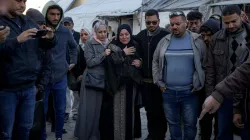Jerusalem: A baby girl froze to death overnight in Gaza, while Israel and Hamas accused each other of complicating ceasefire efforts that could wind down the 14-month war. The 3-week-old baby was the third to die from the cold in Gaza's tent camps in recent days, doctors said, deaths that underscore the squalid conditions, with hundreds of thousands of Palestinians crammed into often ramshackle tents after fleeing Israeli offensives.
The father of 3-week-old Sila, Mahmoud al-Faseeh, wrapped her in a blanket to try and keep her warm in their tent in the Muwasi area outside the town of Khan Younis, but it wasn't enough, he told the news agency The Associated Press. He said the tent was not sealed from the wind and the ground was cold, as temperatures on Tuesday night dropped to 9 degrees Celsius (48 degrees Fahrenheit.) Muwasi is a desolate area of dunes and farmland on Gaza's Mediterranean coast.
“It was very cold overnight and as adults we couldn't even take it. We couldn't stay warm,” he said. Sila woke up crying three times overnight and in the morning they found her unresponsive, her body stiff. “She was like wood,” said al-Faseeh. They rushed her to a field hospital where doctors tried to revive her, but her lungs had already deteriorated. Images of Sila showed the little girl with purple lips, her pale skin blotchy. Ahmed al-Farra, director of the children's ward at Nasser Hospital in Khan Younis, confirmed that the baby died of hypothermia. He said two other babies — one 3 days old, the other a month old — had been brought to the hospital over the past 48 hours after dying of hypothermia.
Israel's bombardment and ground invasion of Gaza has killed over 45,000 Palestinians, more than half of them women and children, according to Gaza's Health Ministry, which does not distinguish between fighters and civilians in its count.
The offensive has caused widespread destruction and displaced some 90 per cent of Gaza's 2.3 million people, often multiple times. Hundreds of thousands are packed into tent camps along the coast as the cold, wet winter sets in. Aid groups have struggled to deliver food and supplies and say there are shortages of blankets, warm clothing and firewood.
Israel has increased the amount of aid it allows into the territory, reaching an average of 130 trucks a day so far this month, up from around 70 a day in October and November. Still, the amount remains well below than previous months and the United Nations says it is unable to distribute more than half the aid because Israeli forces deny permission to move within Gaza or because of rampant lawlessness and theft from trucks.
Meanwhile, hopes for a ceasefire looked complicated Wednesday, with Israel and the militant Hamas group that runs Gaza trading accusations of delaying an agreement. In recent weeks, the two sides appeared to be inching toward a deal that would bring home dozens of hostages held by the militants in Gaza, but differences have emerged.
Although Israel and Hamas have expressed optimism that progress was being made toward a deal, sticking points remain over the exchange of hostages for Palestinian prisoners and the withdrawal of Israeli troops from Gaza, people involved in the talks say.
On Wednesday, Hamas accused Israel of introducing new conditions related to the withdrawal from Gaza, the prisoners and the return of displaced people, which it said was delaying the deal. Israel's government accused Hamas of reneging on understandings that have already been reached.” Still, both sides said discussions are ongoing. Israel's negotiating team, which includes members from its intelligence agencies and the military, returned from Qatar on Tuesday evening for internal consultations, following a week of what it called “significant negotiations."
(With inputs from agency)
ALSO READ: Israel's deadliest strikes on Gaza's refugee camp kill 29 including 8 members of the same family
Latest World News

